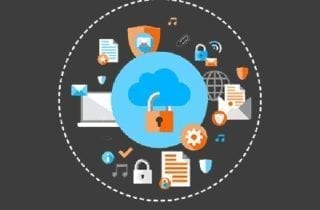Do you know where your data is stored? With the increased emphasis on student data privacy, many school leaders might think they have a handle on cyber security. But even that seemingly simple question may have complex answers. Presenters in the recent edWebinar, “Cyber Security: Concerns, Strategies and Solutions for Schools,” warned that with the increasing variety and strength of cyber attacks, most schools will face incursions. They offered key strategies for going on the offensive against hackers.
Despite universal concerns about student data privacy, communicating school policies can quickly overwhelm school leaders. CoSN has stepped in with guidance for superintendents and principals to help them with several aspects of student data privacy, including best practices for informing the community. In their edWebinar “Assuring Student Data Privacy: Lessons for Our Times,” presenters offered insights into how school leaders can take charge of communications for this critical issue.
While the Individuals with Disabilities Education Act (IDEA) was last reauthorized in 2004, with amendments in 2015, and the Web Content Accessibility Guidelines (WCAG) were updated back in 2008, the demand for accessibility and equality in education continues to grow. Administrators and teachers, who want to help every child reach their potential, can’t afford to wait for new laws and policies. Educators still need to constantly evaluate the effectiveness of accessibility initiatives, advocate for resources for their students, and anticipate where they need to go next. During the edWebinar “Accessibility: Effective, Equitable Learning Environments for All Students,” which is part of a series hosted by CoSN and edWeb.net, the presenters discussed how they approach CoSN’s five steps to ensure accessibility.
Even in today’s tech-heavy environment, before moving to online assessments, leadership needs to ask: Should we? According to Glenn Robbins, Superintendent of Tabernacle Township School District, NJ, and Dr. Donna Wright, Director of Schools, Wilson County Schools, TN, too often the focus is on why everyone else is doing it or the idea that everything needs to be done on a computer. During their presentation, ”Online Assessment: An Evolving Landscape and New Opportunities,” they discussed the lessons they learned when they made the transition and what they would change if they could.
Step 1: Make a plan. That’s the first piece of advice for every superintendent and school leader who asks about creating 1:1 environments in their schools. During an edWebinar for the Empowered Superintendent series, “Leadership for Mobile Learning: Creating a Shared Vision,” the presenters said school leaders, though, often miss key parts of the planning process and end up with useless “hunks of plastic.” The speakers, led by Ann McMullan, Project Director for the CoSN Empowered Superintendents Program, shared their essential elements for a successful 1:1 plan as well as the steps they wish they could redo.
At the beginning of the edtech wave, superintendents saw many benefits from using digital resources in the classroom. But, they also saw a large number of resources being recommitted to just this one aspect of education: space for server farms, money for hardware and software upgrades, overworked personnel, etc. District IT offices were taking on the same tasks as Fortune 500 companies without the ability to implement them as effectively. For administrators looking to take the focus of edtech away from upkeep and back to learning, moving to the cloud could be the answer. Presenters of the edWebinar, “Cloud Computing: Taking Advantage of the Latest Technologies,” which is part of the Empowered Superintendents edWebinar series, shared their reasons for switching to the cloud, how it has helped their schools, and their advice when making the transition.
Of course cyber security is necessary in education. Schools have valuable information to protect for both students and employees. However, as financial and physical security issues arise, cyber security can fall down the list. As Ann McMullan, Project Director, CoSN Empowered Superintendents Program reminded attendees at a recent edWebinar, cyber attacks are increasing in K-12… read more →
“If it’s edtech, it must be good,” used to be the mantra in schools. In fact, many school technology plans fluctuated depending upon the latest fads and what someone learned at a conference and had little connection to curriculum or learning goals. Now, recognizing the disconnect between school and district leaders, the realities of the technology infrastructure, and classroom needs, CoSN and AASA have created the Empowered Superintendent initiative, which is dedicated to helping superintendents, aspiring superintendents and district leadership teams build their knowledge, skills and confidence as technology leaders. During “The Empowered Superintendent: Leading Digital Transformation,” the first in a new edWebinar series, Dr. David Schuler, Superintendent, Township High School District 214 (IL), and Dr. Chris Gaines, Superintendent, Mehlville School District (MO), along with host Ann McMullan, Project Director, CoSN Empowered Superintendents Program, discussed the goals of the program. Overall, they implored listeners to move away from using “tech for tech’s sake” and to become intentional adopters of technology that enhances teaching and learning.
edWeb.net is delighted to announce a partnership with the Consortium for School Networking (CoSN) to support superintendents and school district leaders with an online community and series of edWebinars hosted on edWeb.net. CoSN collaborates with superintendents to increase their capacity to lead technology efforts and is dedicated to helping current and aspiring superintendents and district leaders build on their knowledge, skills, and confidence. Collaboration with peers is one of the most effective ways to learn about effective ideas and practices. edWeb is hosting an online community and engaging edWebinars to help superintendents connect and collaborate and get the maximum value from the CoSN Empowered Superintendents initiative.
In this edWebinar, Dr. David Schuler and Dr. Chris Gaines share best practices for leading technology transformations within a school district setting.










